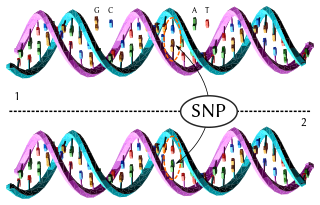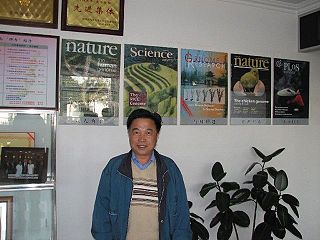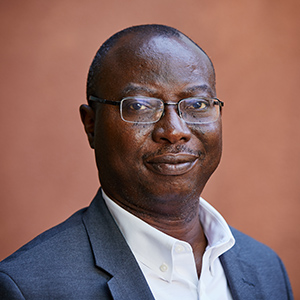Related Research Articles

In genetics and bioinformatics, a single-nucleotide polymorphism is a germline substitution of a single nucleotide at a specific position in the genome. Although certain definitions require the substitution to be present in a sufficiently large fraction of the population, many publications do not apply such a frequency threshold.

Yang Huanming is a Chinese biologist, businessman and one of China's leading genetics researchers. He is Chairman and co-founder of the Beijing Genomics Institute, formerly of the Chinese Academy of Sciences. He was elected as member of the Chinese Academy of Sciences in 2007, a foreign academician of Indian National Science Academy in 2009, a member of the German National Academy of Sciences in 2012, and foreign associate of the US National Academy of Science in 2014.
The International HapMap Project was an organization that aimed to develop a haplotype map (HapMap) of the human genome, to describe the common patterns of human genetic variation. HapMap is used to find genetic variants affecting health, disease and responses to drugs and environmental factors. The information produced by the project is made freely available for research.
Researchers have investigated the relationship between race and genetics as part of efforts to understand how biology may or may not contribute to human racial categorization. Today, the consensus among scientists is that race is a social construct, and that using it as a proxy for genetic differences among populations is misleading.
Gregory Stock is an American biophysicist, best-selling author, biotech entrepreneur, and the former director of the Program on Medicine, Technology and Society at UCLA’s School of Medicine. His interests lie in the scientific and evolutionary as well as ethical, social and political implications of today's revolutions in the life sciences and in information technology and computers.

Human genetic variation is the genetic differences in and among populations. There may be multiple variants of any given gene in the human population (alleles), a situation called polymorphism.
Human evolutionary genetics studies how one human genome differs from another human genome, the evolutionary past that gave rise to the human genome, and its current effects. Differences between genomes have anthropological, medical, historical and forensic implications and applications. Genetic data can provide important insights into human evolution.

The 1000 Genomes Project (1KGP), taken place from January 2008 to 2015, was an international research effort to establish the most detailed catalogue of human genetic variation at the time. Scientists planned to sequence the genomes of at least one thousand anonymous healthy participants from a number of different ethnic groups within the following three years, using advancements in newly developed technologies. In 2010, the project finished its pilot phase, which was described in detail in a publication in the journal Nature. In 2012, the sequencing of 1092 genomes was announced in a Nature publication. In 2015, two papers in Nature reported results and the completion of the project and opportunities for future research.
Himla (Himladevi) Soodyall is a South African geneticist involved in finding some of the oldest human genetic lines, mainly focusing on Sub-Saharan Africa. Her work on DNA has pointed to southern Africa as the most likely geographic region of origin of the human species.

A reference genome is a digital nucleic acid sequence database, assembled by scientists as a representative example of the set of genes in one idealized individual organism of a species. As they are assembled from the sequencing of DNA from a number of individual donors, reference genomes do not accurately represent the set of genes of any single individual organism. Instead, a reference provides a haploid mosaic of different DNA sequences from each donor. For example, one of the most recent human reference genomes, assembly GRCh38/hg38, is derived from >60 genomic clone libraries. There are reference genomes for multiple species of viruses, bacteria, fungus, plants, and animals. Reference genomes are typically used as a guide on which new genomes are built, enabling them to be assembled much more quickly and cheaply than the initial Human Genome Project. Reference genomes can be accessed online at several locations, using dedicated browsers such as Ensembl or UCSC Genome Browser.
Clement Adebamowo is a Nigerian medical researcher and academic. Born in Lagos, Nigeria, Adebamowo is currently Director For Global Health Cancer Research, and a professor of Epidemiology & Public Health, at the University of Maryland School of Medicine. He is known for his work in cancer epidemiology, nutrition epidemiology, and research ethics, particularly in low resource and under-served in Africa.

Charles Nohuoma Rotimi is the Scientific Director of the National Human Genome Research Institute (NHGRI). He joined the National Institutes of Health (NIH) in 2008 as the inaugural Director of the Trans-NIH Center for Research in Genomics and Global Health and was also the chief of the NHGRI's Metabolic, Cardiovascular, and Inflammatory Disease Genomics Branch. He works to ensure that population genetics include genomes from African populations and founded the African Society of Human Genetics in 2003 and was elected its first president. Rotimi was instrumental in the launch of the Human Heredity and Health in Africa (H3Africa) with the NIH and the Wellcome Trust. He was elected to the National Academy of Medicine in 2018.
Human Heredity and Health in Africa, or H3Africa, is an initiative to study the genomics and medical genetics of African people. Its goals are to build the continent's research infrastructure, train researchers and clinicians, and to study questions of scientific and medical interest to Africans. The H3Africa Consortium was formally launched in 2012 in Addis Ababa and has grown to include research projects across 32 countries, a pan-contintental bioinformatics network, and the first whole genome sequencing of many African ethnolinguistic groups.

Vardit Ravitsky Israeli-Canadian is a bioethicist, researcher, and author. She is president and CEO of The Hastings Center, a full professor at the University of Montreal, and a senior lecturer on Global Health and Social Medicine at Harvard Medical School. She is immediate-past president and current vice-president of the International Association of Bioethics, and the director of Ethics and Health at the Center for Research on Ethics. She is a Fellow of the Pierre Elliott Trudeau Foundation, where she chaired the COVID-19 Impact Committee. She is also Fellow of The Hastings Center and of the Canadian Academy of Health Sciences.

Neil Hanchard is a Jamaican physician and scientist who is clinical investigator in the National Human Genome Research Institute (NHGRI), where he leads the Childhood Complex Disease Genomics section. Prior to joining NHGRI, he was an associate professor of molecular and human genetics at the Baylor College of Medicine. He is a fellow of the American College of Medical Genetics and Genomics,. Hanchard's research focuses on the genetics of childhood disease, with an emphasis on diseases impacting global health.
Human genetic clustering refers to patterns of relative genetic similarity among human individuals and populations, as well as the wide range of scientific and statistical methods used to study this aspect of human genetic variation.

Christian Happi is a Professor of Molecular Biology and Genomics in the Department of Biological Sciences and the Director of the African Centre of Excellence for Genomics of Infectious Diseases, both at Redeemer’s University. He is known for leading the team of scientists that used genomic sequencing to identify a single point of infection from an animal reservoir to a human in the Ebola outbreak in West Africa. His research focus is on infectious diseases, including malaria, Lassa fever, Ebola virus disease, HIV, and SARS-CoV-2.

The African Society of Human Genetics (AfSHG) is a learned society and professional membership organization focused on the study of human genetics and genomics in Africans, and open to researchers who are interested in the subject. It has played a role in founding several national genetics societies, and is affiliated with the societies of Cameroon, the Democratic Republic of the Congo, Mali, Egypt, Rwanda, Senegal, South Africa, and Tanzania.

Wylie Burke is a Professor Emerita and former Chair of the Department of Bioethics and Humanities at the University of Washington and a founding co-director of the Northwest-Alaska Pharmacogenomics Research Network, which partners with underserved populations in the Pacific Northwest and Alaska.

Adebowale A. Adeyemo is a Nigerian physician-scientist and genetic epidemiologist specialized in genomics and cardiometabolic disorders. He is the deputy director and chief scientific officer of the Center for Research on Genomics and Global Health at the National Human Genome Research Institute.
References
- 1 2 3 4 "Charmaine DM Royal". Duke University African & African American Studies Department. Archived from the original on 28 September 2020. Retrieved 17 August 2020.
- 1 2 "Charmaine DM Royal". Duke University Global Health Institute. 23 December 2019. Retrieved 17 August 2020.
- ↑ International HapMap Consortium (2003). "The International HapMap Project" (PDF). Nature. 426 (6968): 789–796. Bibcode:2003Natur.426..789G. doi:10.1038/nature02168. hdl: 2027.42/62838 . PMID 14685227. S2CID 4387110.
- ↑ Kittles, R; Royal, C (2003). "The genetics of African Americans: Implications for disease gene mapping and identity". Genetic Nature/Culture: Anthropology and Science beyond the Two-Culture Divide. University of California Press. pp. 219–233.
- ↑ Dula, A; Royal, C; Secundy, M (2003). The ethical and social implications of exploring African American genealogies. Developing World Bioethics. Vol. 3. University of Minnesota. pp. 133–141. doi:10.1046/j.1471-8731.2003.00069.x.
- ↑ "Charmaine Royal – Race, Genetics and Health: Coloring Outside the Lines". The University of Iowa College of Law. Retrieved 17 August 2020.[ permanent dead link ]
- ↑ "Jackson Heart Study Community Ethics Advisory Board". Jackson State University. Retrieved 18 August 2020.
- ↑ Auton, Adam; et al. (2015). "A global reference for human genetic variation". Nature. 526 (7571): 68–74. Bibcode:2015Natur.526...68T. doi:10.1038/nature15393. PMC 4750478 . PMID 26432245.
- ↑ "Ethics Advisory Board". www.illumina.com. Retrieved 21 February 2021.